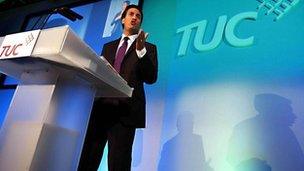How does union-funding of the Labour Party work?
- Published

Ed Miliband wants to change Labour's relationship with the unions
How exactly do the trade unions fund the Labour Party - and will Ed Miliband's proposed changes work?
Rewind to 1984, and the then Prime Minister Margaret Thatcher introduced the Trade Union Act., external
It sets out that unions must ballot their members every ten years if they want a political fund, that is money to spend on campaigns.
Unite, the country's biggest union with 1.4 million members, held its own ballot on retaining a political fund earlier this year.
It was the first time it had had to do it, since Unite came together as an amalgamation of its predecessors, Amicus and the Transport and General Workers Union.
The turnout was pitiful, at 18.6%, but 87.4% of Unite members that took part in the vote, opted to retain the fund.
'Core' rate
In its campaign to ensure the political fund was retained, Unite sent a leaflet to its members, external.
The document emphasised "this is not a ballot on affiliation to the Labour Party. It is about whether we can spend any money on political purposes at all."
It added: "A full-time Unite member paying at the 'core' rate pays 66p per month into the Political Fund. Every member has the right to opt-out of this payment to the Political Fund. It is a tiny amount of money from each member, around 2p per day, but it all adds up to a considerable sum which the Unite can use to support the membership in campaigning."
In many unions, ordinary members automatically contribute to the political fund, unless they opt out.
The reforms suggested on Tuesday by Ed Miliband will not change that.
Unite's political fund was around £7m last year and just over £3m of that went to Labour in affiliation fees.
In return, the unions who make a contribution get a say in policy-making and choosing the Labour leader, a say that proved crucial in securing Mr Miliband the Labour leadership over his brother David three years ago.
'Mend not end'
But now Ed Miliband says he doesn't want union members to pay money to Labour through those fees unless they've deliberately chosen to do so.
So how many will do that?
Nobody knows.
Paul Kenny, the General Secretary of the GMB, the UK's third largest union, predicts just 10% of its members would want to.
Currently, the GMB estimates that around 95% of its members contribute to its political fund and from that some money is passed on to Labour.
Mr Kenny has warned that Ed Miliband's union reforms are "as close as you can get" to ending the union link.
Mr Miliband has repeatedly stressed he wanted to "mend not end" the link.
Paul Kenny believes there will be such a fall in union money for the Labour Party that this will in effect amount to a breaking of the link between his union and the Labour Party.
Though interestingly, the big public sector union Unison already asks its 1.3 million members not just whether they want to contribute to its political fund, but also to Labour, and around half contribute to the Labour pot.
It is also worth remembering that if fewer of their members want their subs to go to Labour, this reform would actually increase the amount union bosses have to spend on campaigns of their own choice.
- Published10 July 2013
- Published10 July 2013
- Published10 July 2013
- Published9 July 2013
- Published9 July 2013
- Published9 July 2013